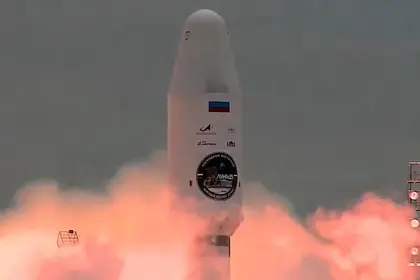Moscow launched its first probe to the Moon in almost 50 years on Friday, the first time that post-Soviet Russia has attempted to place a device on a celestial body.
The rocket with the Luna-25 probe lifted off at 02:10 a.m. Moscow time (23:10 GMT Aug. 10) from the Vostochny Cosmodrome, according to live images broadcast by the Russian space agency Roscosmos.
JOIN US ON TELEGRAM
Follow our coverage of the war on the @Kyivpost_official.
The spacecraft is due to reach lunar orbit in five days. It will then spend between three and seven days choosing the right spot before landing in the lunar south pole area.
When do we know if it’s been successful?
The crunch date for Russia is Aug. 21 when it is due to land on the moon.
“For the first time in history, the lunar landing will take place on the lunar south pole. Until now, everyone has been landing in the equatorial zone,” senior Roscosmos official Alexander Blokhin said in a recent interview.
He added after the launch: “Now we will wait for the 21st. I hope that a highly precise soft landing on the moon will happen.”
According to Russian space expert Vitali Yegorov, the mission is the first time that post-Soviet Russia has attempted to place a device on a celestial body.
“The biggest question will be: Can it land?” he told AFP, stressing that this mission is "of great importance" for Russia.
What’s the mission?
The official aim of the mission is to be the first probe in history to land on the lunar south pole where it will be tasked with “taking (samples) and analyzing the soil” as well as “conducting long-term scientific research,” according Roscosmos.

Moldova Residents Caught in the Middle of Gas Fight
What’s the real mission?
The real mission is a chance for Moscow to show off to the world and try and convey the image that it’s still a viable participant in space exploration and revive the sentiment around the USSR’s perceived glory days when it battled with the US attempting to become the world leader in the arena.
What’s the state of Russia’s space sector?
Not great – the launch is the first mission in Russia’s new lunar program, which gets underway at a time when Roscosmos is being deprived of its partnerships with the West after Moscow’s full-scale invasion of Ukraine.
Russia’s space sector, which is suffering from funding problems, corruption scandals and increasing competition from the United States and China, as well as from private initiatives such as billionaire Elon Musk’s SpaceX.
Despite all this and in characteristic Kremlin fashion, President Putin has taken an “everything is totally fine” approach, invoking the time when the USSR sent the first man into space in 1961, at a time of escalating East-West tensions.
“We are guided by the ambition of our ancestors to move forward, despite difficulties and external attempts to prevent us from doing so,” Putin said at the Vostochny Cosmodrome last year.
You can also highlight the text and press Ctrl + Enter










